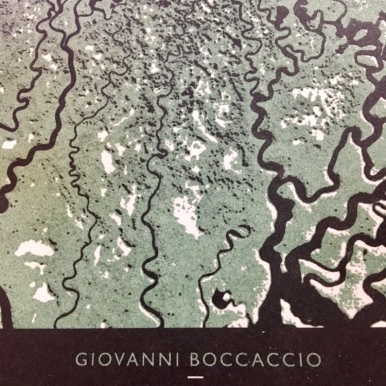Do you ever read a book and realise you know the story you’re reading? Not because – as you may be assuming, that I have been the lead protagonist in a story about seducing nuns, or have dropped down dead on finding out my lover is dead, or being murdered by my lover’s jealous brothers. But I picked up this collection of Boccaccio’s tales quite innocently and was enjoying them thoroughly until I recognised the story that influenced Keats poem, Isabella; or the Pot of Basil.
It is at that point that I was overrun with nostalgia, missing my undergraduate days, and since reading this novel I must admit I’ve been revisiting some old friends like Keats and Coleridge. Because they are so much more than ‘just’ Romantic poets for me now.
Head in Herbs is a story as you may expect from my brief outline to this post. It is a story of a woman in love and her lover is killed by her brothers. She sees this in a dream and heartbroken retrieves the head of her lover from the forest and hides it in the base of a pot of basil. Watering it with her tears daily.

- The Eaten Heart: Unlikely Tales of Love – Giovanni Boccaccio
I am not entirely sure I would admit to being a bit of a romantic publicly but I have been enamoured with the likes of Keats and the other Romantics. So Boccaccio’s tales have qualities that I enjoy, they are relatively simple and perhaps I wasn’t paying close enough attention or was fooled entirely by a good translation – but they don’t feel as old as they are. The Eaten Heart is just a very small part of a larger work called Decameron (1349). The foreword of the Eaten Heart boasts that Decameron is “best known for its bawdy tales of love, appearing in all its possibilities from the erotic to the tragic.” And I must agree with that sentiment.
From what I’ve read in the Eaten Heart I would happily give time to Decameron as they are bold stories, unflinching from what can probably called artful postures of love and romance that make up the classic tradition with a healthy helping of drama. You must remember while reading these stories that you may be over come with a fit of fainting.
From what I’ve said about these stories it may not surprise you to hear then, that the first story in the Eaten Heart is about a man who manages to seduce an entire nunnery. Sowing the Seeds of Love is a little ridiculous story, comically playing out a scenario that involves a man posing as a deaf-mute gardener. He exerts all of his efforts, but alas the gardening begins to suffer as he does not have the energy for them all and ultimately confesses hi secret and negotiates for a permanent position with a timetable for the nuns. This turns out to be a very happy arrangement for all, and I couldn’t help myself, this story won me over entirely.
Sowing the Seeds of Love is probably my favourite out of the entire collection, a few of the others seemed a little of the same-same but this one was so entirely different from the rest of the tales that it really hooked me in. I must admit that I felt a little like I was reading this book to finish it at some points, but on the whole I enjoyed reading it and when I came to Head in Herbs I felt like I had finally filled in a gap in my knowledge. It is one thing to know Keats, but it is another entirely to say you have finally read the short story that influenced one of his well known poems – even if it is five years after this would’ve been useful.
This collection of tales is a shorter read, it will keep you gripped and interested if you have any interest in classics but it doesn’t feel so classic and convoluted that it is remote reading. As such I’m not sure how I’d feel recommending it, it’s easy to access but I could understand someone boring quickly if this is something very far out of what they usually read. But I guess, if you’ve loved Keats and the Romantics, or even read them a little, this is definitely of interest.